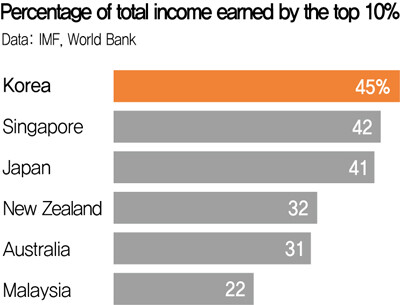hankyoreh
Links to other country sites 다른 나라 사이트 링크
Income inequality in South Korea the most severe in Asia

The top 10% of South Korea’s income earners are taking home nearly half of all income, a new report shows. This is the highest concentration of income among any comparable Asian country. In order to decrease income concentration, the IMF (International Monetary Fund) is calling for an aggressive fiscal policy.
A report titled “Sharing the Growth Dividend: Analysis of Inequality in Asia” that was recently published by the IMF shows that the top 10% of South Korean income earners were collecting 45% of the total income, as of 2013.
This was the highest level of any of the countries that were analyzed, coming in above Singapore (42%), Japan (41%), New Zealand (32%), Australia (31%) and Malaysia (22%).
This analysis relies on data from an income database at the World Bank created from household surveys of various countries and from the World Wealth and Income Database, which is managed by Thomas Piketty, a professor at the Paris School of Economics.
Income concentration among the top 10% of earners in South Korea was at 29% in 1995, but it has soared by 16 percentage points in just 18 years. The overall average in Asian countries over the same period increased by just 1 or 2 percentage points.
Until the mid-1990s, income concentration in South Korea was lower than other Asian countries, including Singapore, Japan and New Zealand.
For South Korea, the report said, “the duality between regular and non-regular employment has been a key driver of inequality.”
“While duality can keep unemployment low, non-regular workers typically earn less, and receive fewer training opportunities and lower social insurance coverage,” the report said.
In addition to this, gender discrimination on the job and the aging society were also mentioned as factors that increase income concentration.
Noting that “lower tax and spending levels and higher reliance on indirect taxes limit the extent of fiscal redistribution,” the report called for a more robust fiscal policy as a means of mitigating income concentration.
Fiscal policy refers to collecting more taxes from high-income earners and spending more on welfare intended for low-income earners.
The report also argued that the difference in the level of legal protection between regular and irregular jobs should be reduced as a remedy for the duality in the labor market and that employment contracts for newly hired workers should balance employment stability and flexibility.
Since the global financial crisis in 2008, the IMF has steadily produced reports contending that resolving income inequality will contribute to sustainable growth.
By Kim Kyung-rok, staff reporter
Please direct questions or comments to [english@hani.co.kr]

Editorial・opinion
![[Column] Park Geun-hye déjà vu in Yoon Suk-yeol [Column] Park Geun-hye déjà vu in Yoon Suk-yeol](https://flexible.img.hani.co.kr/flexible/normal/500/300/imgdb/original/2024/0424/651713945113788.jpg) [Column] Park Geun-hye déjà vu in Yoon Suk-yeol
[Column] Park Geun-hye déjà vu in Yoon Suk-yeol![[Editorial] New weight of N. Korea’s nuclear threats makes dialogue all the more urgent [Editorial] New weight of N. Korea’s nuclear threats makes dialogue all the more urgent](https://flexible.img.hani.co.kr/flexible/normal/500/300/imgdb/original/2024/0424/7317139454662664.jpg) [Editorial] New weight of N. Korea’s nuclear threats makes dialogue all the more urgent
[Editorial] New weight of N. Korea’s nuclear threats makes dialogue all the more urgent- [Guest essay] The real reason Korea’s new right wants to dub Rhee a founding father
- [Column] ‘Choson’: Is it time we start referring to N. Korea in its own terms?
- [Editorial] Japan’s rewriting of history with Korea has gone too far
- [Column] The president’s questionable capacity for dialogue
- [Column] Are chaebol firms just pizza pies for families to divvy up as they please?
- [Column] Has Korea, too, crossed the Rubicon on China?
- [Correspondent’s column] In Japan’s alliance with US, echoes of its past alliances with UK
- [Editorial] Does Yoon think the Korean public is wrong?
Most viewed articles
- 1‘We must say no’: Seoul defense chief on Korean, USFK involvement in hypothetical Taiwan crisis
- 2N. Korean delegation’s trip to Iran shows how Pyongyang is leveraging ties with Moscow
- 3‘Weddingflation’ breaks the bank for Korean couples-to-be
- 4Korea sees more deaths than births for 52nd consecutive month in February
- 5[Column] Park Geun-hye déjà vu in Yoon Suk-yeol
- 6Will NewJeans end up collateral damage in internal feud at K-pop juggernaut Hybe?
- 7[Column] Has Korea, too, crossed the Rubicon on China?
- 8Amnesty notes ‘erosion’ of freedom of expression in Korea in annual human rights report
- 9Samsung barricades office as unionized workers strike for better conditions
- 10[Column] The clock is ticking for Korea’s first lady